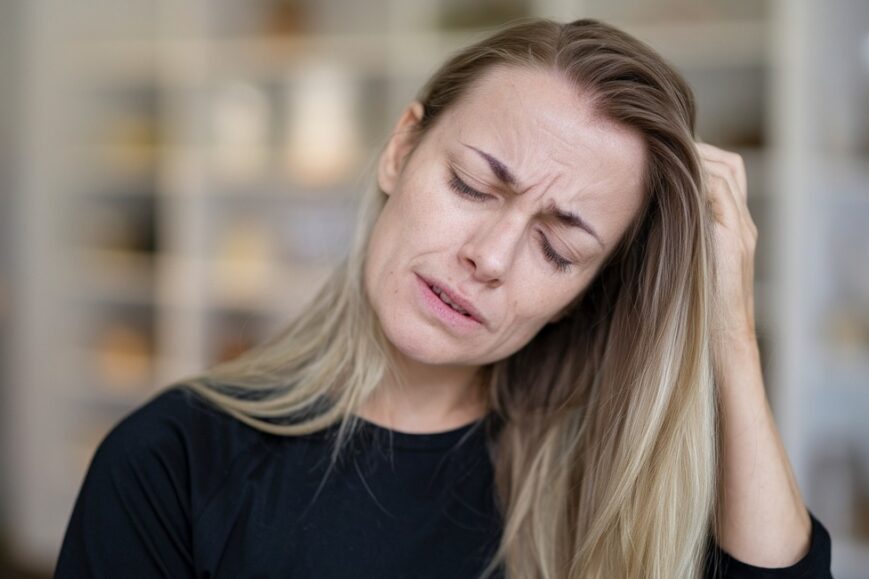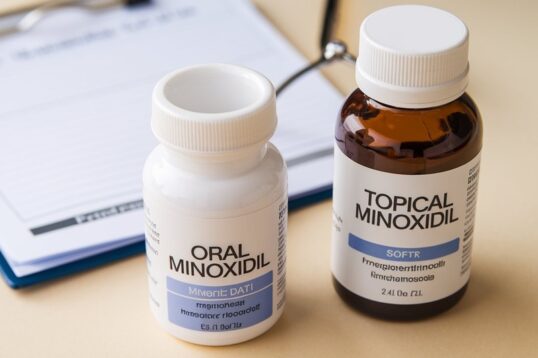Itchy scalp and hair loss are interconnected issues that many people experience at some point. An irritated scalp results in scratching, which damages hair follicles and causes hair to fall off. On the other hand, hair loss leaves some parts of the scalp bare, thus resulting in more irritation.
These issues can be due to factors ranging from poor hygiene to allergies, fungal infections, and hormonal imbalances resulting from stress. For this reason, knowledge of these triggers is foundational to comprehending the problems that must be solved.
This is because scalps that itch and prompt hair loss must be fought for and hence require gentle treatment.
Select shampoos and conditioners that do not contain sulfate, and if there is dandruff or fungal infection, then medicinal shampoos are needed.
Moisturizing the scalp often is a best practice that can also help minimize dryness or itching. Moreover, less stress and a proper diet are suitable for the skin on our scalp, thereby allowing healthier hair growth and lessening the itch.
Causes of Itchy Scalp and Hair Loss
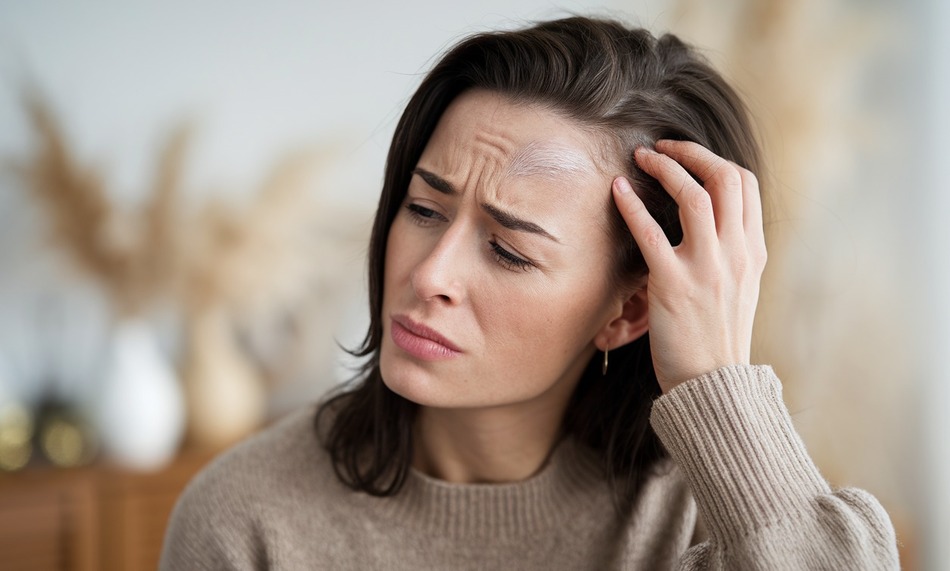
Itchy scalp and hair loss can stem from various underlying conditions. Comprehending these causes is crucial for practical treatment. Here are some common culprits:
It is imperative to ascertain the root of your itchy scalp and hair loss before treatment. If the problems recur, it is best to seek medical advice for an exact diagnosis and management plan.
If your itchy scalp is caused by a fungal infection, anti-fungal treatments like creams or shampoos containing ketoconazole or clotrimazole can help clear the infection and alleviate symptoms, reducing hair loss.
Can Scratching Cause Hair Loss?
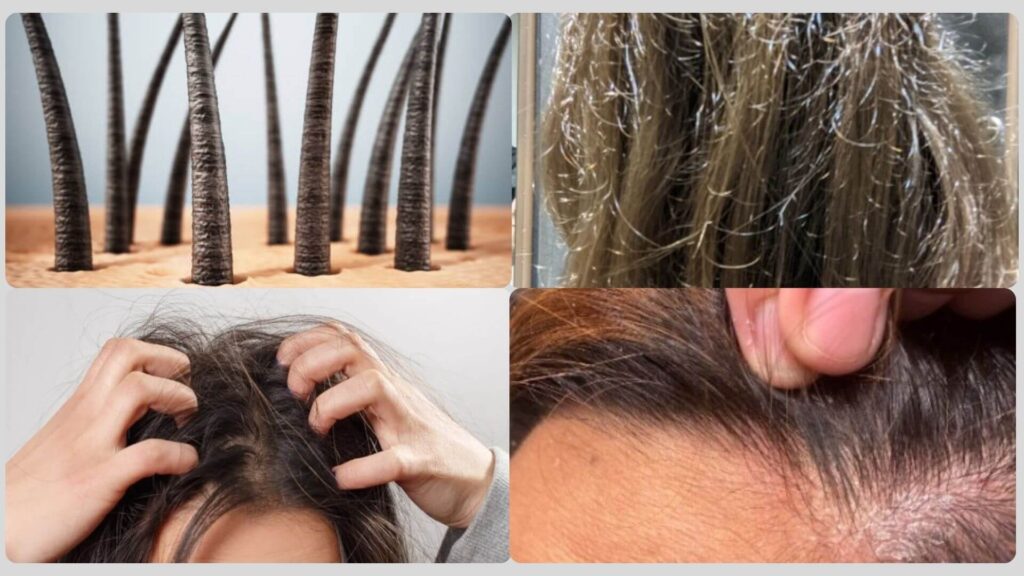
Short answer: Yes.
When your scalp itches, it’s so tempting to scratch for relief, but here’s the kicker—rubbing can lead to hair loss. Here’s why:
Scratching gives short-term relief but long-term damage. The more you scratch, the higher the risk of hair loss and permanent follicle damage. It’s best to tackle the root cause of the itch to save your hair from unnecessary loss.
Avoid tight hairstyles like ponytails, buns, or braids, as they can pull on your hair and cause tension on the scalp. This tension can lead to a condition called traction alopecia, where hair falls out due to strain.
The Connection Between Itchy Scalp and Hair Loss
Itchy scalp and hair loss often go hand in hand due to how certain scalp conditions affect hair health. Here’s how they are linked:
Inflammation and Irritation
- Conditions such as dandruff, seborrheic dermatitis, and psoriasis can cause significant inflammation and irritation on the scalp.
- Dandruff leads to flaking and itching, which can irritate the scalp and weaken hair follicles over time.
- Seborrheic dermatitis is more severe, causing red, greasy patches that can also result in hair shedding if left untreated.
- Psoriasis causes rapid skin cell turnover, leading to thick, scaly patches that can disrupt the normal hair growth cycle.
In all these cases, the inflammation can harm hair follicles, resulting in hair thinning or shedding.
The Impact of Scratching
Excessive scratching of an itchy scalp can exacerbate hair loss. When you scratch, you may inadvertently cause:
- Physical Damage: Scratching can harm the hair follicles, leading to further hair loss.
- Infection Risk: Open wounds from scratching can become infected, potentially leading to more significant hair loss.
Psychological Factors
The discomfort of an itchy scalp can lead to stress and anxiety, known contributors to hair loss conditions like telogen vapour. This condition causes hair follicles to enter a resting stage prematurely, increasing shedding.
Understanding the connection between itchy scalp and hair loss is crucial for effective management. Treating the underlying conditions causing the itchiness can help prevent further hair loss.
If you’re experiencing persistent itchy scalp and hair loss, it’s advisable to consult a healthcare specialist for a personalized treatment plan.
How to Prevent Itchy Scalp and Hair Loss in the Long Run
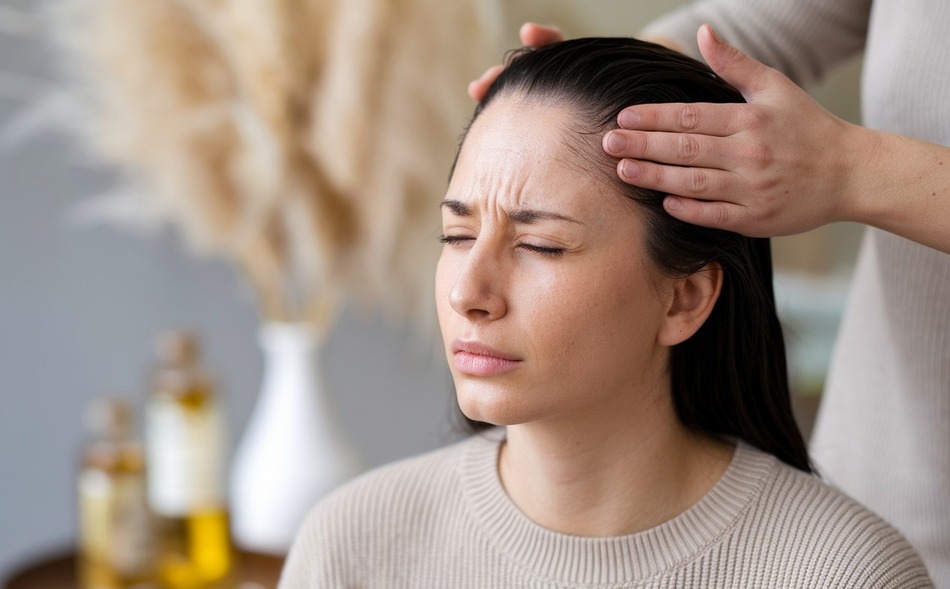
In complement to medical treatments, several home remedies can help manage itchy scalp and hair loss. These remedies are simple to implement and can provide relief while promoting healthier hair. Here are some of the best options:
Scalp Massage with Oils
Massaging your scalp with natural oils can soothe itching and promote hair growth.
Coconut oil: Known for its moisturizing effects, coconut oil can stab the hair shaft and reduce dryness and irritation.
Olive oil: Olive oil is fatty in antioxidants and can help raise the scalp while alleviating itchiness.
Warm a small quantity of oil and gently rub it into your scalp for 10-15 minutes. Leave it on for at least 30 minutes before washing it with a gentle shampoo.
Use Gentle, Sulfate-Free Shampoo
Selecting the right and best shampoo is crucial for maintaining scalp health.
Sulfate-Free Shampoos: These are less harsh and can help prevent further irritation. Look for developments that contain natural ingredients to soothe your scalp.
A gentle shampoo can help reduce itchiness and maintain the natural oils in your hair.
Avoid Hot Styling Tools and Harsh Products
Hot styling tools and harsh hair products can damage hair follicles and exacerbate scalp issues.
Limit Heat Styling: Avoid using blow dryers, straighteners, and curling irons.
Choose Mild Products: Avoid hair sprays, gels, and other styling products that contain alcohol or harsh chemicals.
Natural or organic hair care products can help protect your scalp and hair health.
Reduce Stress
Stress can seriously affect your overall health, including your scalp and hair.
Relaxation Techniques: Incorporate meditation, yoga, or deep breathing routines into your daily routine to help manage stress levels.
Finding ways to relax can improve your mental well-being and reduce hair loss related to Stress
Eat a Balanced Diet
A nutritious diet plays an essential role in maintaining hair health.
Vitamins and Minerals: Concentrate on foods rich in vitamins A, C, D, E, zinc, and omega-3 fatty acids. These nutrients support hair growth and overall scalp health.
Include a variety of fruits, vegetables and nuts, in your meals to nourish your hair from the inside out.
While these home remedies can help manage itchy scalp and hair loss, they should not replace professional medical treatment for severe or persistent cases. If your symptoms continue or worsen, you must consult a healthcare provider for a complete evaluation and tailored treatment plan. By combining these remedies with professional advice, you can work towards healthier hair and a more comfortable scalp.
Just like your skin, your scalp benefits from gentle exfoliation to remove dead skin cells, excess oil, and product buildup. You can use a mild scalp scrub or an exfoliating shampoo once a week to maintain a clean, healthy scalp, reduce itching, and promote better hair growth.
Treatments for Itchy Scalp and Hair Loss

Managing itchy scalp and hair loss effectively depends on identifying the underlying causes. Here are several treatment options available:
Anti-Dandruff Shampoos
For those struggling with dandruff, anti-dandruff shampoos can be a game changer. Look for products containing:
- Selenium sulfide: Helps reduce flaking and inflammation.
- Zinc pyrithione: Known for its antifungal properties, it can alleviate itching and scaling.
These shampoos can significantly reduce dandruff and relieve itchiness, promoting a healthier scalp.
Topical Corticosteroids and Antifungal Medications
If your itchy scalp is due to conditions like psoriasis or fungal infections, your healthcare provider may prescribe:
- Topical corticosteroids: These can help relieve rash and itching.
- Antifungal medications effectively treat fungal infections that cause itchiness and hair loss.
Using these medications as directed can help restore scalp health and prevent further hair loss.
Oral Medications
Oral drugs might be required in more severe cases. These may consist of:
- Antihistamines: Helpful for alleviating allergic reactions that lead to itching.
- Antidepressants are sometimes prescribed for stress-related hair loss, as they can help manage anxiety and improve overall well-being.
Confer with your healthcare provider to decide whether these options suit your situation.
Hair Transplant Surgery
- For individuals experiencing significant hair loss, mainly when other treatments have failed, hair transplant surgery may be an option. This procedure involves relocating hair follicles from a donor site to areas of thinning or baldness, providing a more endless solution to hair loss.
Following your healthcare provider’s advice and using any prescribed medications as directed is crucial. By addressing the underlying causes of itchy scalp and hair loss, you can find effective treatments that restore your scalp health and promote hair growth. Don’t hesitate to seek professional guidance if you are unsure about the best approach for your situation.
Chronic stress can trigger both itchy scalp and hair loss. Practice relaxation techniques like yoga, meditation, or deep breathing exercises to keep stress under control and improve overall scalp health.
When to Seek Professional Help
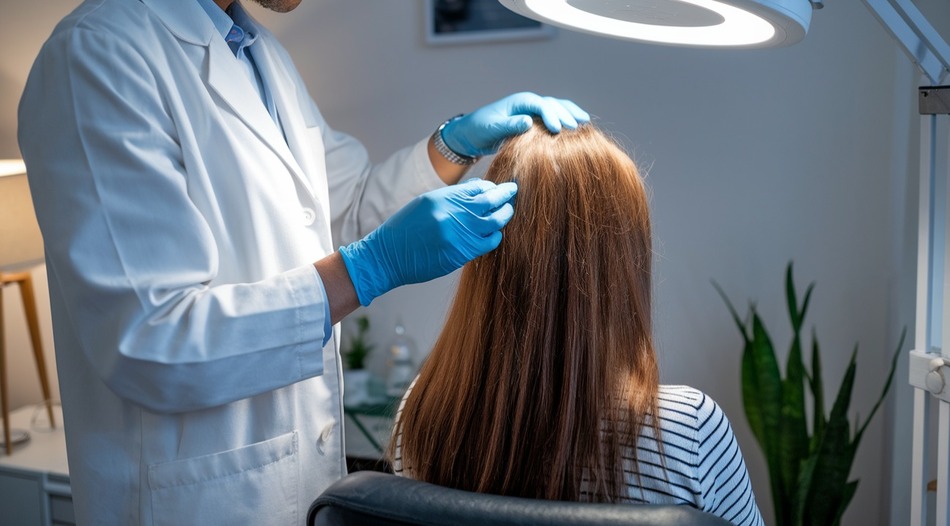
If you’re dealing with an itchy scalp and hair loss, it’s crucial to know when to seek professional medical advice. Here are some key indicators that it’s time to consult a healthcare provider:
1. Severe or Persistent Itching
If your scalp is itching severely or the discomfort doesn’t improve with home remedies, it’s a sign that something more serious may be at play. Persistent itching can indicate underlying conditions that require medical intervention.
2. Visible Signs of Infection
Look for symptoms of infection, such as:
– Pus: Any discharge from the scalp can be a sign of an infection.
– Fever: If you develop a fever alongside scalp issues, seeking medical help is essential.
These signs can indicate that your condition needs immediate attention.
3. Sudden or Rapid Hair Loss
Experiencing sudden or rapid hair loss can be alarming. If you notice significant shedding or thinning of hair quickly, it’s essential to consult a healthcare professional to determine the cause.
4. Bald Patches or Thinning Hair
The appearance of bald patches or noticeable thinning can be concerning. These symptoms may indicate alopecia areata or other scalp disorders requiring evaluation and treatment.
5. Other Concerning Symptoms
Any other symptoms that affect your scalp or hair health should not be ignored. This could include:
– Changes in scalp texture
– Unusual redness or swelling
– Flaking or scaling that worsens
Your doctor can assist in identifying the root cause of itchy scalp and hair loss, as well as suggest the best course of action for therapy. If you encounter any of these symptoms, don’t be afraid to consult a specialist; prompt treatment can improve the situation of your scalp and hair.
Conclusion
Itchy scalp and hair loss are interconnected issues that can significantly affect your quality of life. Understanding the causes—from dandruff and psoriasis to stress and hormonal changes—is essential for effective management.
You can take proactive steps to relieve symptoms and promote healthier hair by exploring various treatments, including medical options and home remedies.
If you experience severe or persistent symptoms, seeking professional medical advice is crucial to identify underlying conditions and receive appropriate treatment.
Taking care of your scalp health helps prevent and itchy scalp and hair loss boosts your confidence and well-being. Remember, you don’t have to face these challenges alone; support is available to help you achieve a healthier scalp and fuller hair.
FAQs
Why is my scalp itchy and my hair falling out?
Hair follicle damage and inflammation brought on by fungus infections, allergic reactions to hair products, and irritated hair follicles can all contribute to hair loss by irritating the scalp. In certain instances, scalp scarring may result in excruciating itching due to the potential for scar tissue to harm the skin’s nerve fibres.
How do I stop my bald head from itching?
To stop your bald head from itching, keep your scalp well-moisturized with a gentle, fragrance-free lotion to prevent dryness. Cleanse regularly with a mild, sulfate-free shampoo, and exfoliate weekly to remove dead skin cells. Protect your scalp from sun exposure by applying sunscreen, and use soothing creams like aloe vera to calm any irritation. Avoid powerful soaps that can strip natural oils, and if the itching persists, consult a dermatologist to rule out conditions like eczema or fungal infections.
What causes an itchy scalp?
Several conditions, such as stress, dandruff, psoriasis, eczema, fungal infections, and allergic responses to hair products can bring on an itchy scalp.
Can hair loss result from an irritated scalp?
Yes, hair loss can result from an irritated scalp. Itchy conditions have the potential to harm hair follicles, and excessive scratching can aggravate hair loss.
How can I treat an itchy scalp and hair loss at home?
Home remedies for an itchy scalp and hair loss include:
Massaging with natural oils like coconut or olive oil.
Using gentle sulfate-free shampoos.
Avoiding harsh hair products.
Incorporating stress-reducing techniques such as meditation or yoga.When should I see a doctor for my itchy scalp and hair loss?
You should seek professional help if you experience severe or persistent itching, visible signs of infection (like pus or fever), sudden or rapid hair loss, bald patches, or any other concerning symptoms affecting your scalp or hair health.
Are there specific shampoos that can help with an itchy scalp?
Yes, specific shampoos can help relieve an itchy scalp. Shampoos, including zinc pyrithione and selenium sulfide, are effective for treating dandruff and controlling yeast overgrowth, a common cause of itching. Ketoconazole shampoos offer antifungal benefits, helping reduce inflammation and flaking. In contrast, coal tar shampoos slow down the growth of skin cells, making them useful for more severe scalp conditions like psoriasis. Additionally, shampoos with tea tree oil provide natural antimicrobial and anti-inflammatory properties to soothe irritation. These targeted treatments can significantly reduce scalp itching and discomfort.
Can stress contribute to an itchy scalp and hair loss?
Indeed. Stress can worsen pre-existing problems on the scalp and cause hair loss through mechanisms such as premature telogen effluvium, in which hair follicles enter a resting period.
Is hair transplant surgery a solution for hair loss due to an itchy scalp?
For those with severe hair loss, hair transplant surgery could be a possibility. However, treating the root causes of the itchy scalp first is crucial to guaranteeing the best results.
What dietary changes can support scalp and hair health?
Eating a balanced diet high in vitamins and minerals, especially those that support hair health, such as zinc, omega-3 fatty acids, and vitamins A, C, D, and E, can encourage a healthy scalp and hair development.
